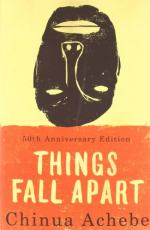|
This section contains 2,960 words (approx. 10 pages at 300 words per page) |

|
SOURCE: “Culture and History in Things Fall Apart,” in Critique: Studies in Modern Fiction, Vol. 11, No. 1, 1969, pp. 25–32.
In the following essay, Meyers discusses Achebe's presentation of both the positive and negative elements of tribal society in Things Fall Apart.
The novels of Chinua Achebe, the best of the new generation of West Africans writing in English,1 begin with the coming of the white man to the bush and end in contemporary Lagos, and show the process of moral and cultural disintegration that results from colonialism. The novels reveal the changing perspectives of each succeeding generation, which have also been described by the Nigerian leader Awolowo before independence: “Our grandfathers with unbonded gratitude adored the British. … Our immediate fathers simply toed the line. We of today are critical, unappreciative, and do not feel that we owe any debt of gratitude to the British. The younger elements in our group...
|
This section contains 2,960 words (approx. 10 pages at 300 words per page) |

|


